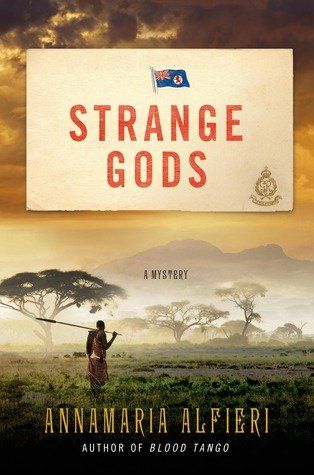 Written by Annamaria Alfieri– Strange Gods opens in 1911 in Kenya – the British East Africa colony and we meet 20-year-old Vera McIntosh. Vera has grown up in Kenya as the daughter of successful coffee plantation owning missionaries. No longer a child, Vera’s fraternisation with the locals is less acceptable and she struggles to find her place in this wild African country.
Written by Annamaria Alfieri– Strange Gods opens in 1911 in Kenya – the British East Africa colony and we meet 20-year-old Vera McIntosh. Vera has grown up in Kenya as the daughter of successful coffee plantation owning missionaries. No longer a child, Vera’s fraternisation with the locals is less acceptable and she struggles to find her place in this wild African country.
Vera longs to find a life for herself beyond the coffee rows of her upbringing and daydreams about being swept away by the 23-three-year-old Justin Tolliver, a colonial police officer with whom she danced at a local gathering. Vera’s is a character imbued with a spirit like that of Karen Blixen from Out of Africa, or Jane Austen’s Elizabeth Bennet from Pride and Prejudice.
Trouble comes to Vera and her family when her uncle Dr Josiah Pennyman is killed with a spear in the coffee field on their land. The law enforcement intervenes. Tolliver shows up to investigate. The question of who is responsible for this killing is complicated, and there are many possible culprits. The murder weapon is a spear from the Maasai tribe and that is where the initial blame is placed. But the higher ups in the colonial police force end up blaming and arresting a medicine man from the Kikuyu tribe by the name of Gichinga Mbura. The motive? His well-known disdain for Pennyman.
Tolliver is not convinced it is Mbura and appeases his supervisor but takes on a more thorough investigation into the death of Pennyman on his own. Tolliver is a strong man reminiscent of the great gentlemen found in old books, with a great jawline and a deep sense of justice.
The strife caused by colonisation drives the mystery, which adds a distinct layer and feel to the text. The shadow of the Empire looms over the issues in the novel and does so without ever coming across as simple or simplified. The Pennyman case is not just one of good versus evil but is instead a complex, sophisticated, and believable problem where everyone seems to have a reasonable stake in a variety of outcomes. You feel for almost everyone in Strange Gods – for the natives who are being stripped of their customs and land, as well as the missionaries and settlers who believe they bring justice, even if that belief is a bit misguided.
Vera and Tolliver stand as more objective participants in the culture, place, and time of the novel. Vera is locally raised while also being a Scottish foreigner. Tolliver has recently arrived in Africa and comes with an anti-slavery, non-colonial mindset. Because of this well-executed setup, you are able to watch how the politics play out through the eyes of both protagonists without being forced to choose your side. You hope that Vera and Tolliver will find each other in this land they are both somewhat estranged from.
The question that runs through Strange Gods is one that is at the heart of every good mystery: what is justice and how is it served? Alfieri shows us the intricacies of such a question in her book and that the crown, the settler, and the coloniser are not always just and true. Alfieri does this so well that it comes off as original even though she is not the first to explore the topic.
Strange Gods beautifully evokes the wild landscape of East Africa using a compelling mystery to do so. The budding relationship between Vera and Tolliver is romantic and heartwarming, though as you approach the conclusion this romance turns into a saccharine melodrama. This might be the only flaw of this book.
Alfieri’s mystery is a treat for fans of sophisticated crime fiction who will delight in how she builds her world. Strange Gods is a promising start to what is now a two book series. Readers interested in books with a strong sense of place and exotic locations, as well as those who enjoy a mystery that employs dramatic and romantic tension will love Strange Gods.
Be sure to check out Alfieri’s wonderful short story The Sultan Rules Mombasa in her co-edited Sunshine Noir which also features Vera and Toliver.
Minotaur
Print/Kindle/iBook
£11.37
Rating: 4 Stars










